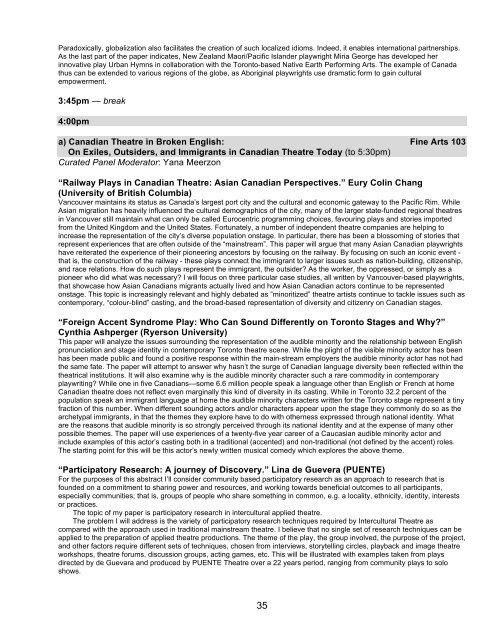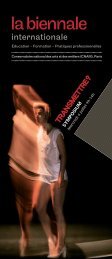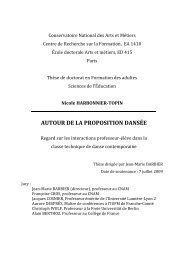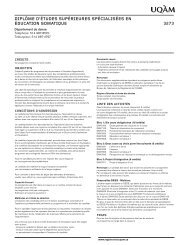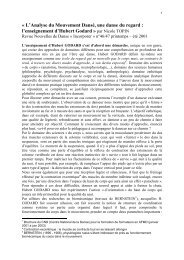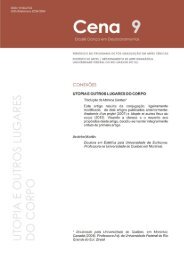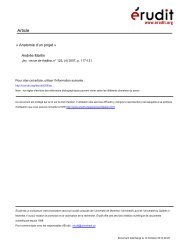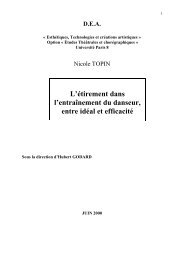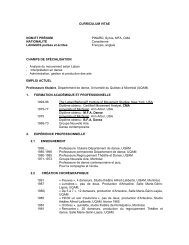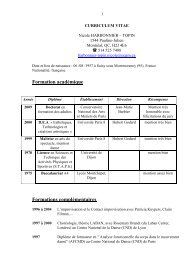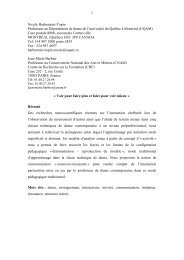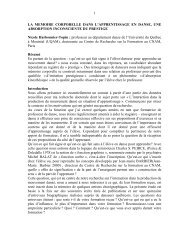Day 2 - Département de danse - UQAM
Day 2 - Département de danse - UQAM
Day 2 - Département de danse - UQAM
Create successful ePaper yourself
Turn your PDF publications into a flip-book with our unique Google optimized e-Paper software.
Paradoxically, globalization also facilitates the creation of such localized idioms. In<strong>de</strong>ed, it enables international partnerships.<br />
As the last part of the paper indicates, New Zealand Maori/Pacific Islan<strong>de</strong>r playwright Miria George has <strong>de</strong>veloped her<br />
innovative play Urban Hymns in collaboration with the Toronto-based Native Earth Performing Arts. The example of Canada<br />
thus can be exten<strong>de</strong>d to various regions of the globe, as Aboriginal playwrights use dramatic form to gain cultural<br />
empowerment.<br />
3:45pm — break<br />
4:00pm<br />
a) Canadian Theatre in Broken English: Fine Arts 103<br />
On Exiles, Outsi<strong>de</strong>rs, and Immigrants in Canadian Theatre Today (to 5:30pm)<br />
Curated Panel Mo<strong>de</strong>rator: Yana Meerzon<br />
“Railway Plays in Canadian Theatre: Asian Canadian Perspectives.” Eury Colin Chang<br />
(University of British Columbia)<br />
Vancouver maintains its status as Canada’s largest port city and the cultural and economic gateway to the Pacific Rim. While<br />
Asian migration has heavily influenced the cultural <strong>de</strong>mographics of the city, many of the larger state-fun<strong>de</strong>d regional theatres<br />
in Vancouver still maintain what can only be called Eurocentric programming choices, favouring plays and stories imported<br />
from the United Kingdom and the United States. Fortunately, a number of in<strong>de</strong>pen<strong>de</strong>nt theatre companies are helping to<br />
increase the representation of the city’s diverse population onstage. In particular, there has been a blossoming of stories that<br />
represent experiences that are often outsi<strong>de</strong> of the “mainstream”. This paper will argue that many Asian Canadian playwrights<br />
have reiterated the experience of their pioneering ancestors by focusing on the railway. By focusing on such an iconic event -<br />
that is, the construction of the railway - these plays connect the immigrant to larger issues such as nation-building, citizenship,<br />
and race relations. How do such plays represent the immigrant, the outsi<strong>de</strong>r? As the worker, the oppressed, or simply as a<br />
pioneer who did what was necessary? I will focus on three particular case studies, all written by Vancouver-based playwrights,<br />
that showcase how Asian Canadians migrants actually lived and how Asian Canadian actors continue to be represented<br />
onstage. This topic is increasingly relevant and highly <strong>de</strong>bated as ”minoritized” theatre artists continue to tackle issues such as<br />
contemporary, “colour-blind” casting, and the broad-based representation of diversity and citizenry on Canadian stages.<br />
“Foreign Accent Syndrome Play: Who Can Sound Differently on Toronto Stages and Why?”<br />
Cynthia Ashperger (Ryerson University)<br />
This paper will analyze the issues surrounding the representation of the audible minority and the relationship between English<br />
pronunciation and stage i<strong>de</strong>ntity in contemporary Toronto theatre scene. While the plight of the visible minority actor has been<br />
has been ma<strong>de</strong> public and found a positive response within the main-stream employers the audible minority actor has not had<br />
the same fate. The paper will attempt to answer why hasn’t the surge of Canadian language diversity been reflected within the<br />
theatrical institutions. It will also examine why is the audible minority character such a rare commodity in contemporary<br />
playwriting? While one in five Canadians—some 6.6 million people speak a language other than English or French at home<br />
Canadian theatre does not reflect even marginally this kind of diversity in its casting. While in Toronto 32.2 percent of the<br />
population speak an immigrant language at home the audible minority characters written for the Toronto stage represent a tiny<br />
fraction of this number. When different sounding actors and/or characters appear upon the stage they commonly do so as the<br />
archetypal immigrants, in that the themes they explore have to do with otherness expressed through national i<strong>de</strong>ntity. What<br />
are the reasons that audible minority is so strongly perceived through its national i<strong>de</strong>ntity and at the expense of many other<br />
possible themes. The paper will use experiences of a twenty-five year career of a Caucasian audible minority actor and<br />
inclu<strong>de</strong> examples of this actor’s casting both in a traditional (accented) and non-traditional (not <strong>de</strong>fined by the accent) roles.<br />
The starting point for this will be this actor’s newly written musical comedy which explores the above theme.<br />
“Participatory Research: A journey of Discovery.” Lina <strong>de</strong> Guevera (PUENTE)<br />
For the purposes of this abstract I’ll consi<strong>de</strong>r community based participatory research as an approach to research that is<br />
foun<strong>de</strong>d on a commitment to sharing power and resources, and working towards beneficial outcomes to all participants,<br />
especially communities; that is, groups of people who share something in common, e.g. a locality, ethnicity, i<strong>de</strong>ntity, interests<br />
or practices.<br />
The topic of my paper is participatory research in intercultural applied theatre.<br />
The problem I will address is the variety of participatory research techniques required by Intercultural Theatre as<br />
compared with the approach used in traditional mainstream theatre. I believe that no single set of research techniques can be<br />
applied to the preparation of applied theatre productions. The theme of the play, the group involved, the purpose of the project,<br />
and other factors require different sets of techniques, chosen from interviews, storytelling circles, playback and image theatre<br />
workshops, theatre forums, discussion groups, acting games, etc. This will be illustrated with examples taken from plays<br />
directed by <strong>de</strong> Guevara and produced by PUENTE Theatre over a 22 years period, ranging from community plays to solo<br />
shows.<br />
35


